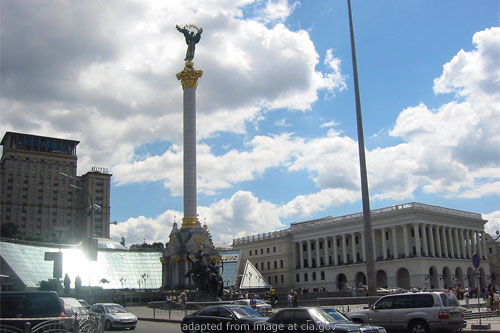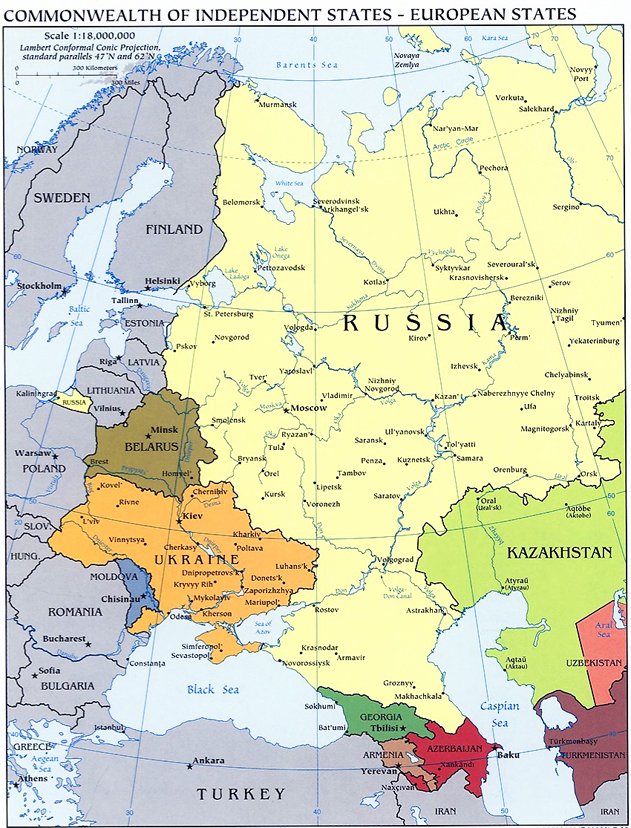NEWSLINK: Ukraine’s Ancient Hatreds

[“Ukraine’s Ancient Hatreds” – The National Interest – Nikolas K. Gvosdev – June 25, 2014]
The National Interest examines the Western response to the crisis in Ukraine, as well as various historical contexts for Russia, Ukraine and the region.
Russian President Vladimir Putin has voiced a “triune people/one people” concept disputed by outsiders, even as it impacts Kremlin policy.
In his public remarks, Putin has indicated that he is a proponent of the “triune people” thesis, which holds that the Eastern Slavs form one overarching community, all descendants of the original people of Rus’ and inheritors of the culture, religion and traditions that were centered at Kiev a millennium ago. In this view, the modern division of the Eastern Slavs into Belorussians, Ukrainians and Russians reflects only regional and linguistic variants of a common people, not the existence of separate nationalities. Putin’s address to both chambers of the Russian legislature on March 18, 2014, made this clear when, speaking about the relationship between Ukraine and Russia, he noted, “We are not merely close neighbors, but we are in fact, as I have said many times, one people. . . . All the same, we cannot be one without the other.” (He has made the “one people” comment on numerous other occasions; for example, in a September 2013 interview with press representatives.)
Putin’s assertion has been echoed by other senior Russian government figures. …
One question raised about the Western response to events in Ukraine will be the level of Western commitment to Ukraine’s development, including in the context of any effort to contain Putin’s Russia:
… casual remarks about how this is the twenty-first century and how great-power machinations for spheres of influence ought to be relegated to the past are insufficient and ill advised. If the choice is made to confront and contain Putin’s Russia—with the eventual goal of initiating change in Russia itself—then Ukraine is on the front line of that campaign. During the Cold War, the United States was willing to marshal huge amounts of resources, first to reconstruct Western Europe and Japan, then to aid the development of states from Korea to Pakistan—and to extend defense commitments to boot. If this is going to be the strategy, however, the United States would need to use its leverage to push for a significant improvement in the standard of living of ordinary Ukrainians and to encourage a greater responsiveness of the government to the concerns of ordinary people. In addition, it would have to encourage a new government to preserve Ukraine as a bilingual (Ukrainian- and Russian-speaking) state that did not restrict the ability of its citizens to espouse a (culturally) Russophile Ukrainian identity. It would need to reduce the possible attractiveness of Russia to key portions of Ukraine while, in the longer run, setting up Ukraine’s ability to serve as an alternate example for successful governance to the Putin model.
Western policy choices will have significant consequences, and cannot be reduced to mere rhetoric.
The worst choice, however, would be to make rhetorical commitments to Ukraine that the West has no real intention of fulfilling. This would only anger both the Russians (who see it as unacceptable interference in their affairs) and the Ukrainians (who have trusted the promises made to them by Western politicians). Putin takes the fate of Ukraine seriously, and has shown he will take major risks to secure the Kremlin’s position. He may be willing to reach an accommodation with the United States—but it is not clear that the United States should or would accept it. But Putin won’t meekly accept that Ukraine, like the Warsaw Pact states before it, will drift into the Western orbit. In his view, Russia, since the end of the Cold War, has signed off on too many compromises and found itself pushed out of Europe. In Ukraine, in 2014, he has drawn the line and effectively said, “This far, and no further.” The decision by the United States—and its allies—to accept that line or to cross it should not be made lightly.

